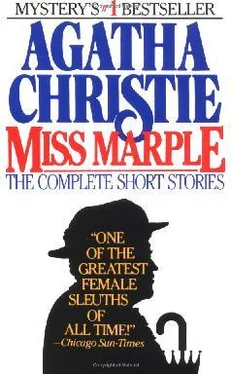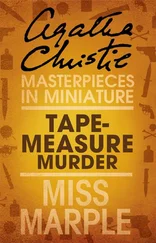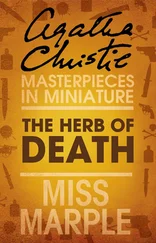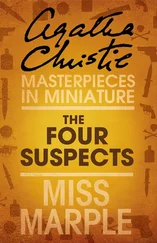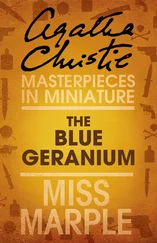Agatha Christie - Complete Short Stories Of Miss Marple
Здесь есть возможность читать онлайн «Agatha Christie - Complete Short Stories Of Miss Marple» весь текст электронной книги совершенно бесплатно (целиком полную версию без сокращений). В некоторых случаях можно слушать аудио, скачать через торрент в формате fb2 и присутствует краткое содержание. Год выпуска: 1986, ISBN: 1986, Издательство: Berkley Trade, Жанр: Классический детектив, на английском языке. Описание произведения, (предисловие) а так же отзывы посетителей доступны на портале библиотеки ЛибКат.
- Название:Complete Short Stories Of Miss Marple
- Автор:
- Издательство:Berkley Trade
- Жанр:
- Год:1986
- ISBN:ISBN-13: 978-0425094860
- Рейтинг книги:3 / 5. Голосов: 1
-
Избранное:Добавить в избранное
- Отзывы:
-
Ваша оценка:
- 60
- 1
- 2
- 3
- 4
- 5
Complete Short Stories Of Miss Marple: краткое содержание, описание и аннотация
Предлагаем к чтению аннотацию, описание, краткое содержание или предисловие (зависит от того, что написал сам автор книги «Complete Short Stories Of Miss Marple»). Если вы не нашли необходимую информацию о книге — напишите в комментариях, мы постараемся отыскать её.
Complete Short Stories Of Miss Marple — читать онлайн бесплатно полную книгу (весь текст) целиком
Ниже представлен текст книги, разбитый по страницам. Система сохранения места последней прочитанной страницы, позволяет с удобством читать онлайн бесплатно книгу «Complete Short Stories Of Miss Marple», без необходимости каждый раз заново искать на чём Вы остановились. Поставьте закладку, и сможете в любой момент перейти на страницу, на которой закончили чтение.
Интервал:
Закладка:
'It was lucky Mrs. Oxley was able to tell us about the will and where it was put,' said the inspector. 'We might have had a long hunt for it otherwise.'
'A Victorian sense of humour,' murmured Raymond West.
'So she left her money to her nephew after all,' said Louise.
The inspector shook his head.
'No,' he said, 'she didn't leave it to Nat Fletcher. The story goes around here - of course, I'm new to the place and I only get the gossip that's second-hand but it seems that in the old days both Miss Greenshaw and her sister were set on the handsome young riding master, and the sister got him. No, she didn't leave the money to her nephew -' Inspector Welch paused, rubbing his chin. 'She left it to Alfred,' he said.
'Alfred - the gardener?' Joan spoke in a surprised voice. 'Yes, Mrs. West. Alfred Pollock.'
'But why?' cried Louise.
'I daresay,' said Miss Marple, 'that she thought Alfred Pollock might have a pride in the house, might even want to live in it, whereas her nephew would almost certainly have no use for it whatever and would sell it as soon as he could possibly do so. He's an actor, isn't he? What play exactly is he acting in at present?'
Trust an old lady to wander from the point, thought Inspector Welch; but he replied civilly, 'I believe, madam, they are doing a season of Sir James M. Barrie's plays.' 'Barrie,' said Miss Marple thoughtfully.
'What Every Woman Knows,' said Inspector Welch, and then blushed. 'Name of a play,' he said quickly. 'I'm not much of a theatre-goer myself,' he added, 'but the wife went along and saw it last week. Quite well done, she said it was.'
'Barrie, wrote some very charming plays,' said Miss Marple, 'though I must say that when I went with an old friend of mine, General Easterly, to see Barrie's Little Mary' - she shook her head sadly - 'neither of us knew where to look.'
The inspector, unacquainted with the play Little Mary, seemed completely fogged.
Miss Marple explained: 'When I was a girl, Inspector, nobody ever mentioned the word stomach.'
The inspector looked even more at sea. Miss Marple was murmuring titles under her breath. 'The Admirable Crichton. Very clever. Mary Rose - a charming play. I cried, I remember. Quality Street I didn't care for so much. Then there was A Kiss for Cinderella. Oh, of course!'
Inspector Welch had no time to waste on theatrical discussion. He returned to the matter at hand.
'The question is,' he said, 'did Alfred Pollock know the old lady had made a will in his favour? Did she tell him?' He added, 'You see - there's an archery club over at Bore-ham - and Alfred Pollock's a member. He's a very good shot indeed with a bow and arrow.'
'Then isn't your case quite clear?' asked Raymond West. 'It would fit in with the doors being locked on the two women - he'd know just where they were in the house.'
The inspector looked at him. He spoke with deep melancholy. 'He's got an alibi,' said the inspector.
'I always think alibis are definitely suspicious,' Raymond remarked.
'Maybe, sir,' said Inspector Welch. 'You're talking as a writer.'
'I don't write detective stories,' said Raymond West, horrified at the mere idea.
'Easy enough to say that alibis are suspicious,' went on Inspector Welch, 'but unfortunately we've got to deal with facts.' He sighed. 'We've got three good suspects,' he went on. 'Three people who, as it happened, were very close upon the scene at the time. Yet the odd thing is that it looks as though none of the three could have done it. The housekeeper I've already dealt with; the nephew, Nat Fletcher, at the moment Miss Greenshaw was shot, was a couple of miles away, filling up his car at a garage and asking his way; as for Alfred Pollock, six people will swear that he entered the Dog and Duck at twenty past twelve and was there for an hour, having his usual bread and cheese and beer.'
'Deliberately establishing an alibi,' said Raymond West hopefully.
'Maybe,' said Inspector Welch, 'but if so, he did establish it.'
There was a long silence. Then Raymond turned his head to where Miss Marple sat upright and thoughtful. 'It's up to you, Aunt Jane,' he said. 'The inspector's baffled, the sergeant's baffled, Joan's baffled, Louise is baffled. But to you, Art Jane, it is crystal clear. Am I right?'
'I wouldn't Say that,' said Miss Marple, 'not crystal clear. And murder, dear Raymond, isn't a game. I don't suppose poor Miss Greenshaw wanted to die, and it was a particularly brutal murder. Very well-planned and quite cold-blooded. It's not a thing to make jokes about.'
'I'm sorry,' said Raymond. 'I'm not really as callous as I sound. One treats a thing lightly to take away from the - well, the horror of it.'
'That is, I believe, the modern tendency,' said Miss Marple. 'All these are, and having to joke about funerals. Yes, perhaps I was thoughtless when I implied that you were callous.'
'It isn't,' said Joan, 'as though we'd known her at all well.'
'That is very true,' said Miss Marple. 'You, dear Joan, did not know her at all. I did not know her at all. Raymond gathered an impression of her from one afternoon's conversation. Louise knew her for only two days.'
'Come now, Aunt Jane,' said Raymond, 'tell us your views. You don't mind, Inspector?'
'Not at all,' said the inspector politely.
'Well, my dear, it would seem that we have three people who had - or might have thought they had - a motive to kill the old lady. And three quite simple reasons why none of the three could have done so. The housekeeper could not have killed Miss Greenshaw because she was locked in her room and because her mistress definitely stated that a man shot her. The gardener was inside the Dog and Duck at the time, the nephew at the garage.'
'Very clearly put, madam,' said the inspector.
'And since it seems most unlikely that any outsider should have done it, where, then, are we?'
'That's what the inspector wants to know,' said Raymond West.
'One so often looks at a thing the wrong way round,' said Miss Marple apologetically. 'If we can't alter the movements or the positions of those three people, then couldn't we perhaps alter the time of the murder?'
'You mean that both my watch and the clock were wrong?' asked Louise.
'No, dear,' said Miss Marple, 'I didn't mean that at all. I mean that the murder didn't occur when you thought it occurred.'
'But I saw it,' cried Louise.
'Well, what I have been wondering, my dear, was whether you weren't meant to see it. I've been asking myself, you know, whether that wasn't the real reason why you were engaged for this job.'
'What do you mean, Aunt Jane?'
'Well, dear, it seems odd. Miss Greenshaw did not like spending money - yet she engaged you and agreed quite willingly to the terms you asked. It seems to me that perhaps you were meant to be there in that library on the second floor, looking out of the window so that you could be the key witness - someone from outside of irreproachably good character - to fix a definite time and place for the murder.'
'But you can't mean,' said Louise incredulously, 'that Miss Greenshaw intended to be murdered.'
'What I mean, dear,' said Miss Marple, 'is that you didn't really know Miss Greenshaw. There's no real reason, is there, why the Miss Greenshaw you saw when you went up to the house should be the same Miss Greenshaw that Raymond saw a few days earlier? Oh yes, I know,' she went on, to prevent Louise's reply, 'she was wearing the peculiar old-fashioned print dress and the strange straw hat and had unkempt hair. She corresponded exactly to the description Raymond gave us last weekend. But those two women, you know, were much the same age, height, and size. The housekeeper, I mean, and Miss Greenshaw.'
'But the housekeeper is fat!' Louise exclaimed. 'She's got an enormous bosom.'
Читать дальшеИнтервал:
Закладка:
Похожие книги на «Complete Short Stories Of Miss Marple»
Представляем Вашему вниманию похожие книги на «Complete Short Stories Of Miss Marple» списком для выбора. Мы отобрали схожую по названию и смыслу литературу в надежде предоставить читателям больше вариантов отыскать новые, интересные, ещё непрочитанные произведения.
Обсуждение, отзывы о книге «Complete Short Stories Of Miss Marple» и просто собственные мнения читателей. Оставьте ваши комментарии, напишите, что Вы думаете о произведении, его смысле или главных героях. Укажите что конкретно понравилось, а что нет, и почему Вы так считаете.
